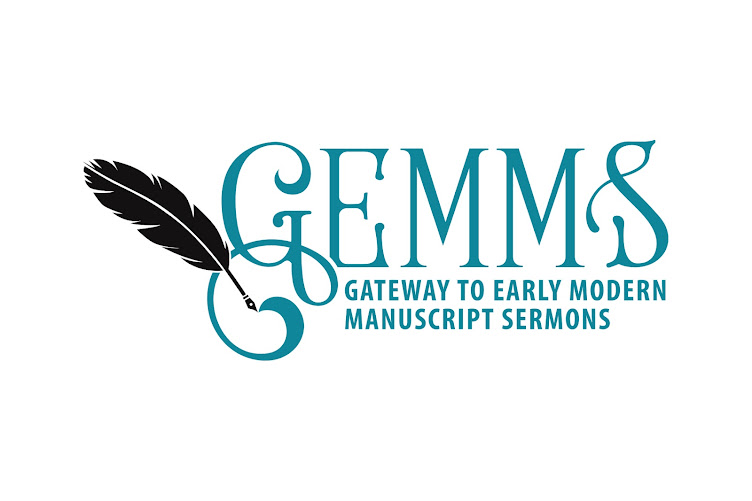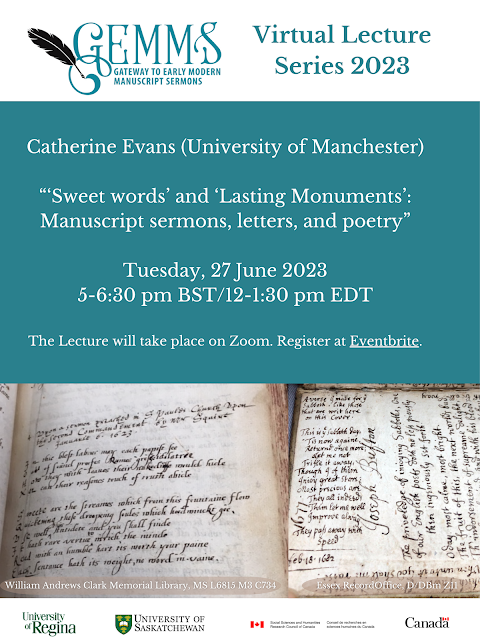GEMMS MS #001768 (MS Gen 408) and GEMMS MS #001779 (MS Gen 410) contain a total of 177 sermons, all of which were given at Communion seasons in Glasgow and the surrounding area between 1695 and 1720 (Figure 1). As such, these manuscripts offer valuable insight into the practice of Communion in the period.
 |
| Figure 1: The two manuscripts (MS Gen 408 and MS Gen 410) side-by-side (Image taken by NC with permission of Glasgow Special Collections) |
The manuscripts form part of the collection of Robert Wodrow (1679 - 1734, GEMMS-PERSON-002061), the Scottish minister and ecclesiastical historian, whose papers are held by the University of Glasgow (MS Gen ACCN 1233). Both manuscripts share the same format and structure; including an index at the beginning detailing the initials of the preacher, chapter and verse of scripture, and the page on which the sermon can be found (Figure 2). The only ownership marks are found in MS #001768, which features an inscription ‘to the Rev[eren]d Mr Rob[er]t Woodrow min[iste]r at Eastwod.’ This inscription initially suggests that the sermons were gifted to Wodrow, meaning he was not the original author, and they have therefore been historically catalogued as having an unknown author.
 |
| Figure 2: Index of MS Gen 408 (Image taken by NC with permission of Glasgow Special Collections) |
However, closer examination of the collection, and a side-by-side comparison with Wodrow’s sermon notes in MS GEN 430-433 (GEMMS manuscripts #001800, #001801, #001818 and #001822) means that it is now possible to confidently attribute these manuscripts to Robert Wodrow. The Communion sermons contained cover an extended period during which Wodrow was firstly a librarian at the University of Glasgow (1697 to 1701) and then, from 1703 onward, minister at Eastwood.[1] The manuscripts can therefore, alongside other items in the collection, offer new insights into the networks that Wodrow established in Glasgow before and during his time in the ministry - an undoubtedly fruitful source for future research! However, today’s blog post will focus on the Communion, considering some of the ways that these manuscripts can broaden our understanding of early modern Scottish practice.
The Communion Season
The First Book of Discipline (1560) of the Church of Scotland sets out the vision for the Reformed church. Within the discussion of the ‘Ninth head concerning the policie of the Kirk’ it proposed that ‘foure times in the yeare we think sufficient to the administration of the Lords table.’[2] This was based on the Genevan model, which had been reduced from Calvin’s original proposal to hold a weekly Communion. The Communion, Lord’s Supper, or Sacrament - some of the many designations - played an important and distinct role in Protestant churches. In Scotland, as in Geneva, one of the key features was the Table - with Communion recipients all being seated around tables rather than kneeling to be given Communion (although this became a disputed issue between the 1621 ratification of the Five Articles of Perth and their repeal in 1690[3]).
The ‘season’ reflects two aspects of Scottish Communion. Firstly, Communion was most commonly held around Easter (which was no longer celebrated after the Reformation[4]), or in the early summer months, creating a season. Secondly, due to the infrequency of the Communion, it became an event in and of itself, taking place over an extended period of around a week. This became known as the Communion Season, or Holy Fair. The c.1830 Alexander Carse painting, Mauchline Holy Fair, portrays the Season as depicted by Robert Burns in his 1786 poem The Holy Fair, in which he contrasts the festivity of the common folk assembled for the Communion with the puritanical exhortations of the ministers (Figure 3). The celebration of the Communion Season was, by Burn’s time, well established, with attendance at multiple Communions becoming common in the late seventeenth and early eighteenth century.
 |
| Figure 3: Alexander Carse (c.1770–1843), The Mauchline Holy Fair, c. 1830 (Photo credit: National Trust for Scotland, Robert Burns Birthplace Museum) |
The importance of the Communion in post-Reformation Scotland has been debated. Andrew Spicer notes that a shortage of ministers meant that the prescription to hold Communion four times a year was not met, meaning that it ‘ceased to have an important place in Scottish worship.’[5] This has been disputed by John McCallum, whose research into Communion practices in Fife between 1560 and 1640, suggests that, whilst Communion was only celebrated annually in most parishes, this infrequency ‘does not make the Sacrament a marginalised element of Scottish worship.’ This, he argues, is evident in the multiple seatings at the Table, ensuring there was space for all parishioners, and the importance with which the Communion Season came to be held.[6] The most comprehensive scholarly discussion of Communion practices is found in Margo Todd’s The Culture of Protestantism in Scotland (2002). Todd’s work reveals how the annual Communion became a great celebration, with urban parishes over time being able to hold more than one in a year. The ministry officially claimed, in their justifications to church authorities, that the practice of holding the Communion around Easter helped to counter the tendency to practice ‘superstition’ at that time. However, it appears, Todd argues, that the local sessions were bowing to the popular demand to hold celebrations at that time of year, with the Communion replacing the traditional Easter festivities.
The Season often took place over a period of at least two weeks, with multiple seatings (as many as three in larger parishes, with the first at 4 am), or even offerings of the Sacrament on two consecutive Sundays to accommodate the needs of the parish. As well as the Communion itself, on the Sabbath, there were also preparation sermons on a Saturday and Monday thanksgiving sermons (these were the three key days, but other sermons also took place - discussed further below). Attendance was compulsory and so shops would be closed and fields left unattended for the duration of sermons, meaning it became a holiday weekend of sorts. Prior to the Communion, examinations were also held over a period of several weeks, testing parishioners on their knowledge of the Catechism. Lists of eligible parishioners would be kept and tokens were given to those who passed their examination, granting them entry to the Communion.[7]
Existing research points to the development of the Communion Season over time, with it holding increasing importance in the liturgical calendar across the seventeenth century. Todd’s discussion draws attention to the importance of the Communion within wider Protestant worship, considering a broad time period and geographical scope, and McCallum’s research on Fife offers a regional perspective. However, the Communion Season remains relatively unexplored in the wider scholarship, and there is an undoubted need for further regional and national considerations of its role and importance in post-Reformation Scotland. GEMMS MS #001768 and MS #001779 demonstrate a wide number of ways in which this topic might be explored - from attendance and the movement of ministers to the content of the sermons themselves.
GEMMS MS #001768 and MS #001779
Wodrow’s record of the sermons allows us insight into the parishes that he frequented, and how often, and on which date, the Communion was held within each parish. Since the manuscripts were catalogued as unassociated to one another they are not in chronological order. MS #001779 (MS Gen 410) covers the period between 1695 and 1702, when Wodrow was a librarian at the University of Glasgow and confirms his attendance at Communion in five different parishes. MS #001768 (MS Gen 408) covers the later period of 1712 and 1720, during which Wodrow was the minister of the parish of Eastwood. In contrast to the earlier period, Wodrow attended a far larger number of Communions in this period, totaling 39 different Communions over the nine years. This included the Communion season within his own parish, which was held annually in August. John McCallum has shown that in Fife between 1560 and 1640 that the months of March and Easter, and in particular the dates surrounding Easter, were the most common choice for the Communion Season, with the summer months being the second choice.[8] The evidence within the Wodrow manuscripts for Glasgow and the surrounding area suggests that spring appears to have fallen out of favour by the late seventeenth century or was perhaps never as popular in the west of the country - a question for future research to uncover. Wodrow’s record of Communion seasons points to the spring months being no more popular than Autumn. The date of the Communions varies between parishes and across years, but the manuscript sermons reveal a clear dominance of the summer months.
As Todd highlights, the Communion Season took place over an extended period of time. The manuscripts provide extensive detail on the structure of the Communion, which appears to most often have taken place over a number of weeks, with the preceding Sabbath(s) before Communion featuring preparatory sermons. In the week of the Communion itself, there were four key days: the Thursday fast day, the Saturday Communion preparation (Figure 4), the Communion on the Sabbath, and the Monday after – with at least one sermon, but usually more, held on each day. On the Communion day, the manuscripts record a number of different sermons, such as the Action Sermon, the sermon given ‘before the tables’, and the sermon ‘at tables.’ In addition to the Monday directly after Communion, which often involved as many as three sermons, the following Sabbath might also feature a sermon relating back to the Communion.
 |
| Figure 4: A sermon given ‘By Mr John Dickson … Saturday befor[e] the co[mmun]ion’, August 15 1696. MS Gen 410, p. 94. (Image taken by NC with permission of Glasgow Special Collections) |
Alongside his own parish, Wodrow frequently attended Communion season at the Barony Parish, as well as the Inner and Outer parishes of the High Kirk, with which he had established a connection in the earlier period. For the Barony Parish, the months given for Communion vary from June in 1712, October in 1713, November in 1714, July in 1715, 1716 and 1717, and February in 1719. This points to two possibilities: either the parish often found the need to move their annual Communion, or by the early eighteenth century the Barony parish was able to hold Communion more than once a year. The latter is highly likely given that Wodrow attended Communion within so many parishes, even dividing his weekends on occasion. In June 1718, for example, he attended the Thursday fast sermon at Govan and then the Saturday, Communion Day, and Monday sermons at Mearns (MS Gen 408, pp. 349, 351-352, 356). Todd has estimated that in Glasgow alone there were around 13,000 Communion tokens produced in 1700, in contrast to 4,000 in 1604, attesting to their growth and frequency.[9] This is supported by Wodrow’s manuscripts, which reveal the large number of Communion seasons taking place in the Glasgow area, with ministers and attendees travelling between parishes and often attending multiple seasons within the year.
 |
| Figure 5: ‘Preaching tent’, National Museums of Scotland (Image accessed 26/01/2024) http://nms.scran.ac.uk/database/record.php?usi=000-100-045-830-C |
References
Further reading on Communion and post-Reformation worship in Scotland
~ Nicole Maceira Cumming





